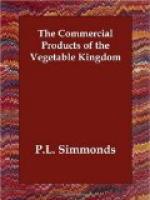That it would soon become a most valuable article of diet amongst the laboring classes, and on ship board particularly, if, once brought into use, there can be no doubt. The coffee-tree can be grown to advantage for the leaf in the lowlands of every tropical country, where the soil is sufficiently fertile, whilst it requires a different soil and climate to produce the fruit[7]. Dr. Hooker, in the Jury Reports, observes upon the prepared coffee leaves, submitted by Dr. Gardner, of Ceylon, to be used as tea leaves, that they are worthy of notice as affording a really palatable drink when infused as tea is; more so, perhaps, than coffee is to the uninitiated. That this preparation contains a considerable amount of the nutritious principles of coffee, is evident from the analysis; but as the leaves can only be collected in a good state at the expense of the coffee bush, it is doubtful whether the coffee produced by the berries be not, after all, the cheapest, as it certainly is the best.
TEA.
The immense traffic in the produce of this simple shrub, the growth of a remarkable country, hitherto almost entirely isolated from the western nations, is one of the most remarkable illustrations of the enterprise and energy of modern commerce. The trade in tea now gives employment to upwards of 60,000 tons of British shipping, and about ten millions sterling of English capital, producing a revenue to this country of nearly six millions sterling.
Every reflecting man will admit that articles of such vast consumption as tea and coffee (amounting together to more than 343,500 tons annually), forming the chief liquid food of whole nations, must exercise a great influence upon the health of the people.
There is scarcely any country in the world in which a dietetic drink or beverage resembling tea, is not prepared, and in general use, from some exotic or indigenous shrub. The two chief plants laid under contribution are, however, the Chinese tea-plant, and a species of holly peculiar to South America, producing the Paraguay tea. Astoria theiformis is used at Santa Fe as tea. The leaves of Canothus Americanus, an astringent herb, have been used as a substitute, under the name of New Jersey tea.




